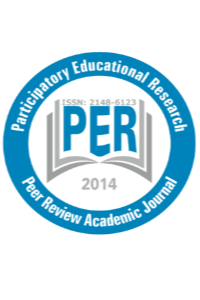
Participatory Educational Research
Yazarlar: Cem Oktay GÜZELLER, Levent ERTUNA
Konular:Eğitim, Bilimsel Disiplinler
DOI:10.17275/per.15.spi.2.5
Anahtar Kelimeler:Attitudes towards computers,PISA,Gender,School type,Region,Internet usage duration
Özet: The purpose of this research is to determine the students’ attitudes towards computers with reference to PISA 2012 Turkey sample. The study analyzes whether the attitudes of students differ according to gender, school type, region and time spent on the internet at home and at school both on weekdays and at the weekends. It is framed in the form of a descriptive survey research. The sample consists of 4538 15-year-old Turkish students who took PISA 2012. The data was collected through the two-dimensional Attitudes towards Computers Scale (ATTCOMPS) used in PISA 2012. As for the data analysis, firstly, a Confirmatory Factor Analysis (CFA) was administered for the construct validity of the ATTCOMPS and the two-dimensional structure of the scale consisting of the importance of the Computer as a Tool for School Learning (CATFSL) and the Limitations of the Computer as a Tool for School Learning (LCATFSL) was verified. During the second phase, Cronbach Alpha coefficient was calculated in order to measure the internal consistency of the scale. To analyze the possible significant differences among the groups in terms of students’ attitudes regarding the sub-dimensions of ATTCOMPS, a multivariate variance analysis tool MANOVA was utilized. The findings of the research show that CATFSL did not differentiate with reference to gender whereas the LCATFSL released significant differences in favour of girls. In terms of school type, there was a significant difference only between general high schools and vocational high schools with reference to CATFSL. However, the LCATFSL released significant differences among all types of schools. With regard to the results of the region variable, there was no significant difference for CATFSL. Nonetheless, with reference to the LCATFSL, the participants in the Mediterrenean Region had the lowest attitude and there was a significant difference among the students’ attitudes in Aegean, East Marmara and West Black Sea Regions. Lastly, the findings of the weekly time spent on the internet variable indicated that both CATFSL and LCATFSL release meaningful differences